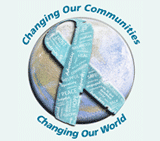Fall 2011 Newsletter
The atmosphere in Kansas and at KCSDV not only seems to be about change, but also about strengths and priorities. Change can provide an opportunity for review, reflection, and a renewed commitment to our cause.
Have no doubt, KCSDV remains strong and dynamic. Over the last year, KCSDV staff responded to nearly 4,000 calls for technical assistance from advocates and allies. KCSDV also sponsored over 100 in-person training events and 50 Webinars, reaching more than 3,200 people with critical information about sexual assault, domestic violence, dating violence and stalking. KCSDV and its member programs have implemented a new standards and accreditation process that is committed to building the services that “every victim every time” deserves.
That said, in the face of today’s economic realities, it is critical for KCSDV to develop a funding base outside the public sector. Local programs rely heavily on support from the private sector and I urge you to continue that support. At the same time, KCSDV’s private sector revenue totals less than 1% of its budget and we need to increase that percentage.
Our goal with this letter is to raise an initial $25,000 to support an annual fundraising campaign with growing returns.
I invite you to be a part of this exciting and important initiative by making a contribution. With your help, the Coalition will continue to stand strong and remain consistent in its advocacy for victims and survivors of sexual assault, domestic violence, dating violence, and stalking.
Thank you for your support,

Joyce Grover,
Executive Director
 Ms. Palle Rilinger has been the President and CEO of Metropolitan Organization to Counter Sexual Assault (MOCSA) since 1984 and has worked tirelessly to promote MOCSA’s services and provide extensive prevention and education services to the metropolitan Kansas City area. After 27 years of excellence in leadership and service, Ms. Rilinger is set to retire from her position at MOCSA at the end of 2011.
Ms. Palle Rilinger has been the President and CEO of Metropolitan Organization to Counter Sexual Assault (MOCSA) since 1984 and has worked tirelessly to promote MOCSA’s services and provide extensive prevention and education services to the metropolitan Kansas City area. After 27 years of excellence in leadership and service, Ms. Rilinger is set to retire from her position at MOCSA at the end of 2011.
Under Ms. Rilinger’s leadership, MOCSA has become a leader among sexual assault service providers. One example of this leadership was the recent invitation to MOCSA by the Resource Sharing Project, a national sexual assault technical assistance provider, to present MOCSA’s innovative work to a national audience at the Sexual Assault Services Program National Forum in July 2011 in Alexandria, Virginia. Ms. Rilinger presented a workshop at the National Forum on the use of support groups as tools of healing for survivors of sexual violence.
Ms. Rilinger has led a distinguished career that began with obtaining a master’s degree in social work from the University of Kansas and working in the areas of mental health and child protection before beginning her role dedicated to ending sexual violence and non-profit administration. The Kansas Coalition Against Sexual and Domestic Violence wishes to congratulate Ms. Rilinger for her tremendous achievements. While her insight and leadership will be missed, she leaves MOCSA as a strong, survivor-centered organization that will continue to thrive. We extend a sincere thanks to Ms. Rilinger for dedicating her career to this work.
By Stephine Bowman, KCSDV Protection Order Attorney
Recently, the Inter-American Commission on Human Rights (IACHR) issued a report (Lenahan v. United States, Case No. 12.626, Inter-Am. C.H.R., Report No. 80/11 (2011)) finding the United States in violation of international human rights law for failing to protect Jessica Lenahan (Gonzalez) and her daughters, Leslie, Katheryn and Rebecca Gonzales from domestic violence despite acknowledging their safety risks by issuing an order of protection. The IACHR’s holding was contrary to the previous 2005 Supreme Court case, Town of Castle Rock, CO v. Gonzales, 545 U.S. 748 (2005), which found no violation of Ms. Lenahan’s constitutional right to due process. This holding neither creates binding legal precedent nor overturns the 2005 ruling of the Supreme Court. It does, however, highlight the need for not only creating legislation, procedures and protocols aimed at protecting victims of domestic violence but also implementing and enforcing these laws, procedures and protocols and holding those who fail to do so accountable.
According to the IACHR Report, Jessica Lenahan (Gonzales) had received a protection order against Simon Gonzales, giving her sole physical custody of their three daughters, allowing him one weekly dinner visit with the children to be arranged by the two parents. On June 22, 1999, however, Simon Gonzales abducted his three children from the front yard in violation of the protection order. Jessica Lenahan repeatedly sought the help of the Castle Rock Police Department to find her children and enforce her protection order. Despite her eight calls to the Police, no significant action was taken to locate Simon Gonzales or the children. During this time, Mr. Gonzales purchased a hand gun and ammunition from a licensed seller, passing an FBI background check. At 3 am the following day, Simon Gonzales arrived at the Castle Rock Police Station and opened fire. Law enforcement returned fire, killing Simon Gonzales. The bodies of Leslie, Katheryn and Rebecca Gonzales were found in the bed of their father’s truck. Though they had suffered multiple gun shots, no thorough investigation into the actual deaths of these girls was conducted.
In Gonzales, the Supreme Court of the United States held that Castle Rock did not violate the procedural due process rights of Jessica Gonzales (Lenahan) by not enforcing her order of protection. The court reasoned that law enforcement has discretion in deciding who to arrest even under the domestic violence mandatory arrest statutes enacted in many jurisdictions throughout the United States. The Court found that the unfortunate circumstances of this case were the actions of a private individual, Simon Gonzales, and the state held no responsibility for failing to perform any duty owed to Ms. Gonzales.
The IACHR, however, determined that the actions of the United States violated Ms. Lenahan’s international human rights by failing to protect her by not enforcing her protection order. Specifically the commission held “that the systemic failure of the United States to offer a coordinated and effective response to protect Jessica Lenahan and her daughters from domestic violence, constituted an act of discrimination, a breach of their [the state’s] obligation not to discriminate and a violation of their [Jessica Lenahan and her daughter’s] right to equality before the law” under international human rights treaties. (¶ 170). The IACHR held the “State’s duties to protect and guarantee the rights of domestic violence victims must also be implemented in practice . . . restraining orders are critical in the guarantee of the due diligence obligation in cases of domestic violence. They are often the only remedy available to women victims and their children to protect them from imminent harm. They [protection orders] are only effective, however, if they are diligently enforced.” (¶ 163). In the present case, the United States had failed to protect this family after acknowledging the need to do so by issuing the protection order. The facts of the case showed a lack of understanding by the local law enforcement of domestic violence and the serious risk facing these children. Even the federal government cleared Simon Gonzales for the purchase of a firearm despite such being contrary to federal laws intended to protect victims of domestic violence. Finally, the IACHR recognized a failure by the government to sufficiently investigate the deaths of these children and the local law enforcement’s lack of response to prevent it. The IACHR notes that the United States, by not enforcing its own domestic violence laws “fosters an environment of impunity and promotes the repetition of violence” as the state does not consider taking effective action against domestic violence a priority. (¶168).
Though the IACHR report provides no binding authority in the United States, these findings provide a moral victory for advocates against domestic violence, adds weight to the reasoning of the dissenting Justices of the Supreme Court, and continues a conversation on an international level about the rights and needs of survivors.
A group of community partners in Newton was selected in January of 2010 as a pilot site for a state project funded by a federal grant. Newton used the federal dollars to enhance the community’s response to domestic violence and provide safety for victims and their children through the criminal justice domestic violence response process.
The community partners working on the project have strengthened the overall effectiveness of the entire domestic violence process including 911, law enforcement, prosecutors, judges, and domestic violence advocates by incorporating best practices, model policies, extensive training and funding to help the community. GTEAP, which stands for Grant to Encourage Arrest and Protection Order Policies, is a U.S. Department of Justice Office of Violence Against Women grant intended to improve the multi-disciplinary approach to addressing domestic violence.
The U.S. Surgeon General has declared that attacks by male intimate partners are the number one cause of injury to women between the ages of fifteen and forty-four. In 2009, Harvey County 911 Dispatch received 500 domestic violence related calls which resulted in 259 incidents where law enforcement were involved and 203 arrests (KBI report “DV and Rape Statistics in KS” November, 2010).
There are unique barriers to safety that victims in rural communities face, including the fact that rural perpetrators of domestic violence and sexual assault violate protective orders three times more often than perpetrators in more urban locations and that delayed police and medical response time when responding to isolated rural residences make it difficult for victims to report abuse, leave abusive relationships or seek services.
Greg Nickel, Newton Municipal Court Administrator, explains, “This issue deals with problems that are deeply rooted in home lives and don’t lend themselves to being resolved by a blanket, one-size fits all solution. The GTEAP program has had a phenomenal effect on our ability to substantively address domestic violence in our community.
Members of the Newton/Harvey County GTEAP Community Partnership include:
Newton Chief of Police
Harvey County Sheriff
The City & County Attorneys
City & District Court Judges
Harvey County DV/SA Task Force
Parole Services
Court Services
Community Corrections
Batterer’s Intervention Program
Newton’ City Manager
Grant funding began in January 2010 and has since funded extensive domestic violence trainings for Partnership Members, including all law enforcement, corrections personnel, advocates and many local attorneys and judges. The grant has also supported the creation of a Coordinated Community Response team (CCR) which meets regularly and has funded three full-time positions, including the Newton Police Department DV Detective Mitchell Nedrow who specializes in domestic violence cases for victim safety & offender accountability.
“Through this project, not only have I investigated numerous domestic violence incidents,” says Nedrow, “these investigations have led to larger felony arrests…[w]ithout this position being in place, these detailed reports and investigations would not have been possible.”
The two other funded positions are the Harvey County DV/SA Task Force Police Response Advocate (PRA) Coordinator and Newton Municipal Court Victim-Witness Coordinator. PRA Coordinator Lisa Donahue oversees the Police Response Advocacy (PRA) program which includes specially trained advocates who respond to all DV crime scenes in Newton to provide advocacy services to victims and their families. Newton Municipal Court Victim-Witness Coordinator Terri Headrick works to assist domestic violence victims navigate the Municipal Court process.
In February 2011 the city of Newton’s GTEAP project was presented with the Project of the Year award at Kansas’ Annual Safe Homes, Safe Streets reception hosted by the Kansas Coalition Against Sexual and Domestic Violence (KCSDV).
Joyce Grover, the Executive Director of KCSDV said about this project “We honor everyone involved with this transformative project that, in many cases, will be life-saving for victims of domestic violence. Lessons learned from this project will be used to improve statewide response to victims of domestic violence crimes across Kansas.”
The grant cycle for the current award ends September 30, 2011. Applications have been submitted to continue the project for an additional three year cycle, but award recipients have not yet been announced.
This year’s conference, Human Trafficking in the U.S. and its Intersections with Domestic and Sexual Violence: HOW TO IDENTIFY, ASSESS AND SERVE VICTIMS OF TRAFFICKING, will be held October 13, 2011, in Manhattan, and will feature Becky Bullard, a national trainer on human trafficking with the Polaris Project. Ms. Bullard joined the Polaris Project in October of 2009 and works with the National Human Trafficking Resource Center and the Training and Technical Assistance Team. She serves as the regional specialist for 9 southern states and brings an expertise in domestic and sexual violence issues to the NHTRC. Ms. Bullard has conducted trainings for service providers, community members and international audiences on human trafficking and intersections with related fields such as domestic violence and runaway homeless youth. Prior to joining Polaris, Ms. Bullard worked on issues of violence against women as a Victim Witness Coordinator for the Nashville District Attorney’s Office and Chair of the Nashville Coalition Against Domestic Violence.
The conference is open to advocates, attorneys, law enforcement, medical professionals, and other allies, and will explore the dynamics of human trafficking and its intersections with domestic violence and sexual violence advocacy work
Member program advocates can also take advantage of a follow-up training, Advanced Issues in Advocacy with Noncitizen Survivors of Domestic and Sexual Violence and Trafficking, held October 14 in Manhattan. KCSDV Immigration Project Attorney Kursten Phelps and Outreach Advocacy Coordinator Jessica Vanderweide will facilitate a training focused specifically on complex advocacy issues arising with foreign-born survivors, including public benefits eligibility and safety planning concerns, among other topics.
 The National Sexual Assault Conference was held September 14-16, 2011 in Baltimore, Maryland. The sponsors included the Pennsylvania Coalition Against Rape, the National Sexual Violence Resource Center, the California Coalition Against Sexual Assault, the Maryland Coalition Against Sexual Assault, and the Illinois Coalition Against Sexual Assault.
The National Sexual Assault Conference was held September 14-16, 2011 in Baltimore, Maryland. The sponsors included the Pennsylvania Coalition Against Rape, the National Sexual Violence Resource Center, the California Coalition Against Sexual Assault, the Maryland Coalition Against Sexual Assault, and the Illinois Coalition Against Sexual Assault.
Kansas was well represented at this year’s conference. In addition to several members of the KCSDV staff, six members of the Just ASK: Autonomy and Safety of Kansas Collaboration attended as well. The attendees represent three Kansas centers for independent living and two Kansas domestic violence and sexual assault programs. The CILs represented include Southeast Kansas Independent Living, Living Independently in Northwest Kansas, and Prairie Independent Living Resource Center. The two Kansas SA/DV centers include Sexual Assault/ Domestic Violence Center and Options, Inc.
From September 14-16, participants enjoyed a variety of keynote speeches and workshops centered on the theme of “Changing our Communities, Changing Our World.” The keynote addresses certainly provided that perspective, with Becca Stevens discussing her work in her local community of Nashville, Tennessee, MESHELLE and LaMarr Darnel Shields sharing their experiences in communities across the United States, and Mona Eltaahway providing her perspective on the anti-sexual violence movement worldwide and specifically in Northern Africa and the Middle-East.
Laurel Klein Searles, Staff Attorney at KCSDV, shared her thoughts on the conference, “It was interesting to see the anti-sexual violence work that is being done at different levels throughout the country and around the world. The conference provided an important reminder that in this movement we are all connected by our mission to end sexual violence regardless of whether we are from a small town in Kansas or Port Said, Egypt.”
Next year’s Sexual Assault Conference will be held August 22-24, 2012 in Chicago Illinois. For more information, please visit: icasa.org.
Between July 1, 2010 and June 30, 2011, KCSDV provided 50 webinars and 107 in person trainings to 4,036 advocates and allies from July 2010 through June 2011. These trainings were offered to advocates, law enforcement, court personnel, attorneys, medical professionals, mental health providers, substance abuse provides, educators, disability advocates, child welfare professionals, and many other community allies.
During this same period, KCSDV answered 3,956 calls for technical assistance, up 20% from the previous year. Calls primarily came from KCSDV Member Programs that provide direct services to survivors. However, we also received over 1,000 calls from allied professionals including health care and law enforcement.
Brooke Atwood joins KCSDV for the 2011-2012 academic year as she completes her MSW Practicum Internship. She has worked as a corrections officer for five years and graduated from Kansas State University in 2006 with a Bachelors of Science in criminology degree and a minor in women’s studies. Ms. Atwood will graduate in May from the University of Kansas with a Masters of Social Work in administration and advocacy.
KANSAS CRISIS HOTLINE: 888-END-ABUSE | 888-363-2287

